Les Vampires Blu-ray Movie
HomeLes Vampires Blu-ray Movie 
Kino Lorber | 1915 | 420 min | Not rated | Aug 14, 2012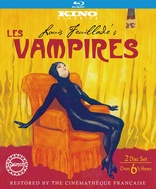
Movie rating
7.3 | / 10 |
Blu-ray rating
| Users | 0.0 | |
| Reviewer | 3.5 | |
| Overall | 3.5 |
Overview
Les Vampires (1915)
An intrepid reporter and his loyal friend battle a bizarre secret society of criminals known as The Vampires.
Starring: Musidora, Édouard Mathé, Marcel Lévesque, Jean Aymé, Renée CarlDirector: Louis Feuillade
| Foreign | Uncertain |
| Drama | Uncertain |
| Crime | Uncertain |
| Adventure | Uncertain |
| Action | Uncertain |
| Mystery | Uncertain |
| Thriller | Uncertain |
Specifications
Video
Video codec: MPEG-4 AVC
Video resolution: 1080p
Aspect ratio: 1.35:1
Original aspect ratio: 1.33:1
Audio
Music: LPCM 2.0
Subtitles
None
Discs
50GB Blu-ray Disc
Two-disc set (2 BDs)
Playback
Region A (locked)
Review
Rating summary
| Movie | 4.0 | |
| Video | 4.0 | |
| Audio | 4.5 | |
| Extras | 0.5 | |
| Overall | 3.5 |
Les Vampires Blu-ray Movie Review
Qui? Quoi? Quand?
Reviewed by Casey Broadwater August 13, 2012More prolific than even Georges Méliès—though less known—Louis Feuillade was the most prodigiously active director in early French cinema, cranking
out some 630 films over his eighteen-year career. Granted, most of these were one-reelers or shorter, but Feuillade is especially notable for his
lengthy, multi-episode serial films. These might be thought of as precursors to the modern TV season; just as viewers tune in each week to find out
what happens next to Walter White on Breaking Bad, audiences in WWI-era France would make repeat trips to the theater to see the
continuing adventures of the titular Fantômas, a dastardly villain, or Judex, a proto-pulp superhero.
These two serials bookend Feuillade's undisputed magnum opus, Les Vampires, a ten-part criminal epic that was released in installments
between November 1915 and June 1916. Taken as a whole, it's considered one of the longest films ever—clocking in at over six and a half hours—and
though it was dismissed in its time as a tasteless lowbrow diversion, Les Vampires has been subsequently embraced by those who've
recognized it as being ahead of its time, including Luis Buñuel, Georges Franju, and Alfred Hitchcock. The film has played no small part in the evolution
of the crime thriller, and there are traces of its cinematic DNA in everything from Fritz Lang's M to David Fincher's The Girl with the
Dragon Tattoo.
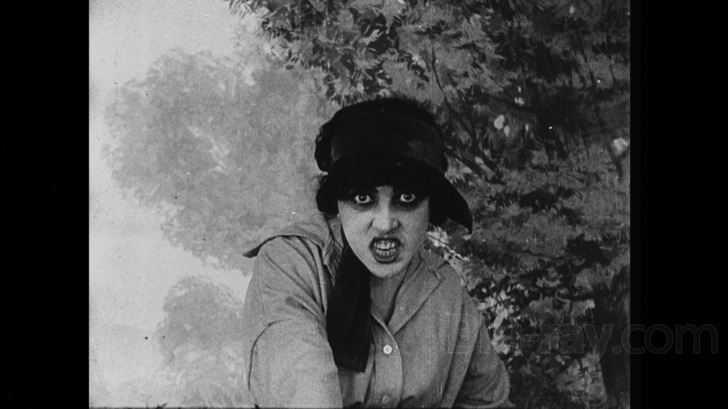
Musidora as Irma Vep
For the narrow crossover population on the Venn diagram of silent film fans and Twilight/True Blood geeks, it may come as a disappointment that Les Vampires has nothing to do with the seductive, bloodsucking creatures of the night. Instead, the film is titled after a diabolical gang of underground criminals who merely refer to themselves as The Vampires, owing to their all-black ninja-style outfits and mostly nocturnal villainy. In the opening episode, we're introduced to the hero of the series, Philip Guérande (Édouard Mathé), a "dynamic reporter" who—with help from his comic-relief sidekick, Mazamette (Marcel Levesqué)—decides to embark on an investigation after learning that the body of the police detective trailing The Vampires has been found in a swamp, decapitated. This was grisly stuff for the time, simply by implication, but—in a scene that upstages Se7en—Feuillade actually shows us the head, which has been sent in a box to Guérande as a warning.
From the outset, Feuillade is unusually frank about violence and its consequences. Whether entirely intentionally or not, over the course of the following nine episodes—which vary in length from 15 to 60 minutes—he mirrors some of the brutality that was happening less than fifty miles from Paris along the Western Front, where the Allied and Central powers were then stalemated in trench warfare. Fatal gunshot wounds. Poisonings. Bombs and mortar rounds. Episode five, "Dead Man's Escape," even features a gas attack on the French aristocracy—we watch in horror as the bodies collapse onto one another, gasping for air—orchestrated by the Grand Vampire (Jean Aymé).
Well, the first Grand Vampire, anyhow. During the span of the series, Guérande finds himself pitted against several antagonists, each more powerful than the last. There's Satanus (Louis Leubas), an explosives master, Venemous (Frederik Moriss), a chemist who uses his trade for evil, and Juan-José Moréno (Fernand Herrmann), a mesmerist who leads a rival gang. But the real baddie here, the one everyone who's seen Les Vampires remembers, is the femme fatale Irma Vep—take a second to unravel the anagram—played by the iconic actress Musidora, who was the French equivalent of America's vampy sexpot, Theda Bara. Irma Vep appears in the third episode as a cabaret singer at "The Howling Cat," but it's quickly revealed that she's the scheming assistant of the Grand Vampire, responsible for putting many of the gang's plans into action.
Slinking around in a form-fitting bodysuit, her eyes ringed in black, Musidora's performance is as alluring as it is disturbing, and she steals every scene she's in. (The role would eventually inspire Olivier Assayas' Irma Vep, a 1996 film about a fictional remake of Les Vampires, starring Maggie Cheung.) By comparison, Vep is far more fertile and interesting a character than Guérande, a bland and stalwart good guy with no real internal conflicts. Though she's not quite an antiheroine—she's decidedly evil, with no redeeming qualities—most modern viewers will find themselves rooting for her, if only because she gives the series its manic, destructive glee.
Watching Les Vampires as a "modern viewer" does require a certain amount of patience, and a willingness to put the film in its historical context. (I wouldn't recommend watching all six-and-a-half hours in one go.) Most of the early installments were only outlined beforehand, and largely improvised while shooting, giving the plot and narrative execution of each episode a simplistic cat-and-mouse quality. The camerawork and editing are minimalist too—probably due to budgetary necessity, and not aesthetic choice—with long, predominantly stationary shots and few examples of cross- cutting or other then-innovative techniques.
That said, Feuillade does have a great sense of space and mood—occasionally filming on-location in derelict sections of gloomy wartime Paris—and Les Vampires is an indisputable, indispensable precursor to the German Expressionism of the 1920s, the gangster movies of the '30s, and the WWII-era advent of film noir. The conventions are all here in their early forms—disguises and secret hideouts, double-crosses and twist reveals, the dangerous vixen and the vigilant(e) detective. Genre filmmaking has change a lot over the past one hundred years, but Les Vampires and its lasting influence go to prove that many of the fundamentals have stayed the same.
Les Vampires Blu-ray Movie, Video Quality 
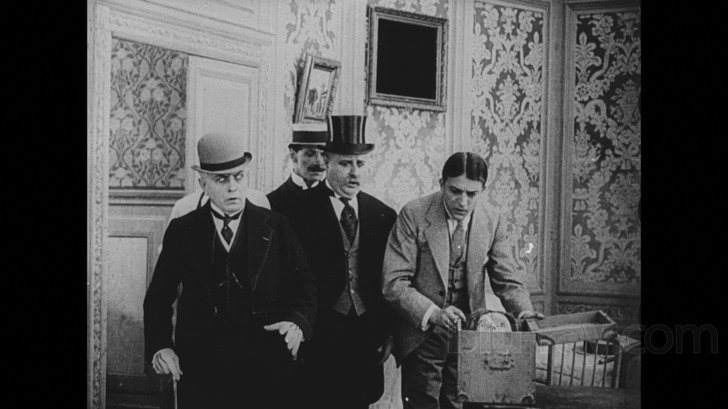
Authorized by Gaumont Studios—now the oldest continuously operating film production company—Kino's new 1080p/AVC-encoded Blu-ray is sourced from a 1996 restoration overseen by the Cinémathèque Française and Louis Feuillade's grandson, Jacques Champreux. As with most silent Kino releases, the seven-hour film is essentially presented as-is, with no attempt to digitally remove specks, scratches, or other age-related issues. The print damage is consistent throughout—white spots, brightness flickering, contrast changes, vertical lines, even visible sprocket holes at times—but for a film approaching one hundred years old, Les Vampires is in surprisingly decent shape, with no major warping and few distracting stains. The high definition remaster presents an immediately appreciable upgrade in clarity compared to Image Entertainment's DVD set, and if you're familiar with the films, you'll definitely notice newfound detail and refined textures. Tonally, this new release is better too, with more natural-looking color casts during the tinted sequences and a black and white gradient that's generally punchy without looking overblown. Finally, the picture looks untouched by DNR or edge enhancement, and there are no apparent compression issues. A pleasure to watch.
Les Vampires Blu-ray Movie, Audio Quality 
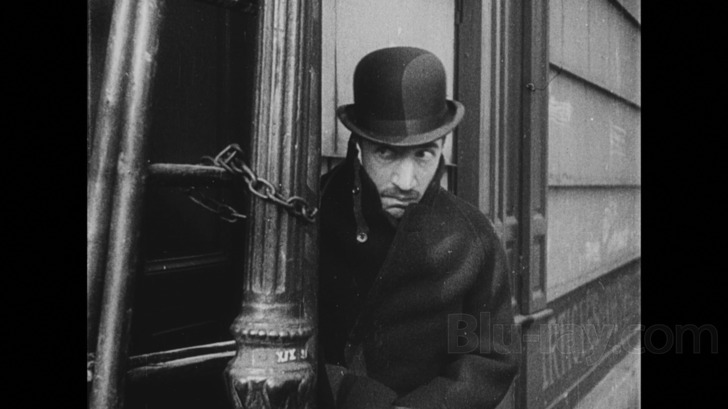
Kino has commissioned the Mont Alto Motion Picture Orchestra to compile and perform a new score, and the results—presented by way of an uncompressed Linear PCM 2.0 stereo track—are wonderful. The music is always complementary to the onscreen action, without overpowering it, and it sounds clear and clean, with good presence and more than sufficient dynamic breadth. Some might be disappointed to learn that that Robert Israel score from Image Entertainment's DVD set isn't also included as an option here, but personally, I think the Mont Alto compositions suit the film fine. I should also note here that instead of keeping—and subtitling—the original French intertitles, Kino has built new intertitles from scratch, using period-appropriate typefaces and design. I've thoroughly suppressed my inner purist, and I'm actually quite happy with the new title cards.
Les Vampires Blu-ray Movie, Special Features and Extras 
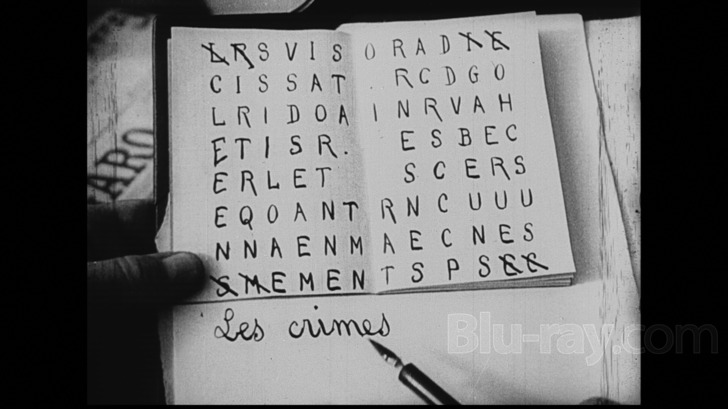
I would've loved a featurette on the film's restoration, or a talking head piece with a few experts giving their takes on the film's influence, but unfortunately, the only extra here is a trailer for Feuillade's previous serial, Fantômas.
Les Vampires Blu-ray Movie, Overall Score and Recommendation 
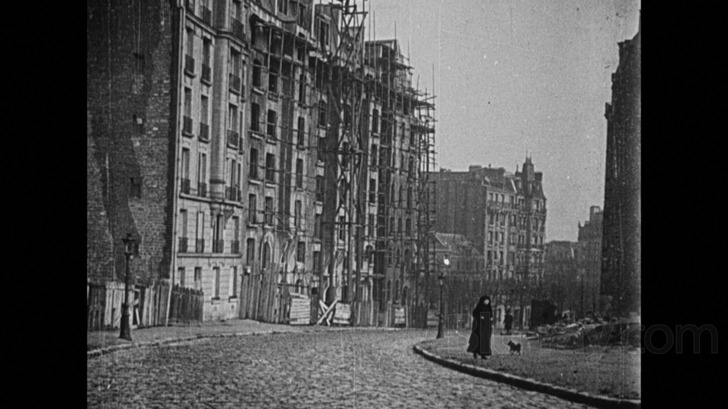
Les Vampires has three distinctions that make it worth checking out: 1.) Taken collectively, it's one of the longest films ever, 2.) it features the seductive Musidora in a prototypically vampy femme fatale role, and 3.) it's a fantastic early example of the crime thriller, featuring—and arguably originating, in some cases—many of the genre conventions that we know and take for granted today. Kino's new Blu-ray release is unfortunately short on supplements, but it features a striking new high definition picture that presents the film as it's never been seen before on home video. I wouldn't recommend watching all six-and-a-half hours in one sitting, but if approach Les Vampires like a TV series—watch one or two episodes and then tune back in later—the film still has the power to shock and awe. Recommended for all crime genre buffs and silent film fans.
Similar titles
Similar titles you might also like

Un flic
Dirty Money
1972

Dr. Mabuse: The Gambler
Dr. Mabuse, der Spieler - Ein Bild der Zeit
1922

The American Friend
Der amerikanische Freund
1977

Fantomas: 5-Film Collection
Fantômas in the Shadow of the Guillotine / Juve vs. Fantômas / The Murderous Corpse / Fantômas vs. Fantômas / The False Magistrate
1913

The Professional
Le professionnel
1981

Tell No One
Ne le dis à personne
2006

The Wages of Fear 4K
Le salaire de la peur | 4K Restoration on 4K UHD and BD
1953

Master
2016

Judex
1963

Quai des Orfèvres
1947

La vérité
The Truth
1960

Yokohama BJ Blues
ヨコハマBJブルース | Yokohama BJ burûsu | Limited Edition
1981

Mr. Klein
Monsieur Klein
1976

Infernal Affairs II
無間道II
2003

Mother
마더 / Madeo
2009

Violent Cop
その男、凶暴につき
1989

High and Low 4K
天国と地獄 / Tengoku to jigoku
1963

Gangs of Wasseypur
2012

Wolves, Pigs & Men
狼と豚と人間 / Ōkami to buta to ningen
1964

Le Samouraï 4K
1967
